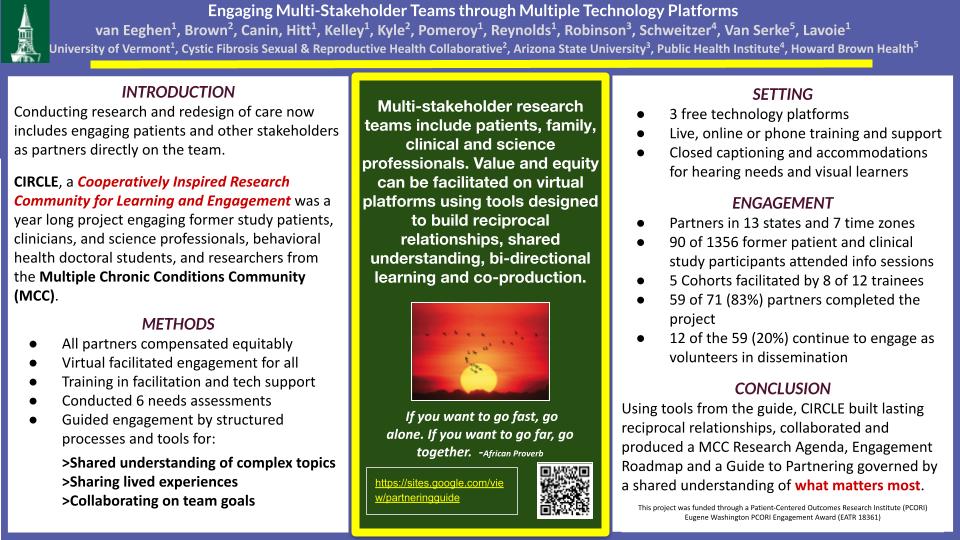PC03: Engaging Multi-Stakeholder Teams through Multiple Technology Platforms
Constance van Eeghen, DrPH, MHSA; GEORGIA BROWN, BS, MA; Hayley Van Serke, PsyD; Juvena Hitt, MPH; Paula Reynolds; Jennifer O'Rourke-Lavoie, BS; Hanna Schweitzer, MPH; Jennifer Kyle, MS; Tonica Robinson, LLM, MPP; Beverly Canin; Kairn Kelley, PhD; Doug Pomeroy
Abstract
Background/Significance
Team based activity, including quality improvement, redesign of care, and research, increasingly includes the participation of patients or other stakeholders as partners. Stakeholders must overcome barriers to participation, especially if also managing multiple chronic conditions (MCCs) which account for 38% or more of all deaths in the US. To demonstrate engagement tools for stakeholders from the MCC community, regardless of location or mobility, participants from a national study were invited to trial virtual platforms for team building and shared understanding of what matters most when managing MCCs.
Setting
Engagement activities were conducted on 3 technology platforms: Zoom™, Google™, and Slack™ communication tools. These platforms were free, accessible to all members and supported with training sessions. This technology assisted those with differing abilities in hearing or dexterity, allowing all to manage health conditions safely while participating.
Methods
Members of the MCC community, including patients, behavioral health providers, and doctoral students, were recruited and trained, using virtual platforms and tools, as facilitators over a 3 month period (Sept-Dec 2020). Participants from a national research study on MCCs were invited to join a 10 week trial (Feb-Apr 2021) of these partnering tools. Those interested attended a 1 hour education session and, if available, were assigned to 1 of 5 cohorts led by facilitators in dyad teams. Engagement tools included affinity diagrams, lived experience maps, and appreciative response steps to collaborate. Evaluation was based on participant assessment of their comfort and satisfaction with engagement tools and outcomes.
Results
Outreach to MCC stakeholders resulted in 12 facilitators in-training, 8 of whom continued on to support the cohorts. From a pool of 1356 study participants, 90 attended information sessions, 59 started the 10 week trial and 51 finished, with 86% retention over 10 weeks. All participants utilized the virtual platforms and tools successfully. Participant comfort was high regarding relationship dynamics for 74%, cultural competency for 79%, and team dynamics for 54%.
Conclusions
Multi-stakeholder team members, including patients, can engage in meaningful work from multiple locations using virtual platforms and tools to build relationships, share understanding, and co-produce deliverables that they value. Tools from this project will be available via website.
Team based activity, including quality improvement, redesign of care, and research, increasingly includes the participation of patients or other stakeholders as partners. Stakeholders must overcome barriers to participation, especially if also managing multiple chronic conditions (MCCs) which account for 38% or more of all deaths in the US. To demonstrate engagement tools for stakeholders from the MCC community, regardless of location or mobility, participants from a national study were invited to trial virtual platforms for team building and shared understanding of what matters most when managing MCCs.
Setting
Engagement activities were conducted on 3 technology platforms: Zoom™, Google™, and Slack™ communication tools. These platforms were free, accessible to all members and supported with training sessions. This technology assisted those with differing abilities in hearing or dexterity, allowing all to manage health conditions safely while participating.
Methods
Members of the MCC community, including patients, behavioral health providers, and doctoral students, were recruited and trained, using virtual platforms and tools, as facilitators over a 3 month period (Sept-Dec 2020). Participants from a national research study on MCCs were invited to join a 10 week trial (Feb-Apr 2021) of these partnering tools. Those interested attended a 1 hour education session and, if available, were assigned to 1 of 5 cohorts led by facilitators in dyad teams. Engagement tools included affinity diagrams, lived experience maps, and appreciative response steps to collaborate. Evaluation was based on participant assessment of their comfort and satisfaction with engagement tools and outcomes.
Results
Outreach to MCC stakeholders resulted in 12 facilitators in-training, 8 of whom continued on to support the cohorts. From a pool of 1356 study participants, 90 attended information sessions, 59 started the 10 week trial and 51 finished, with 86% retention over 10 weeks. All participants utilized the virtual platforms and tools successfully. Participant comfort was high regarding relationship dynamics for 74%, cultural competency for 79%, and team dynamics for 54%.
Conclusions
Multi-stakeholder team members, including patients, can engage in meaningful work from multiple locations using virtual platforms and tools to build relationships, share understanding, and co-produce deliverables that they value. Tools from this project will be available via website.

Gillian Bartlett (NACRG President)
gillian.bartlett@health.missouri.edu 8/5/2021Being a strong proponent of patient-partnered research, I was very pleased to see this work. Great example for others.